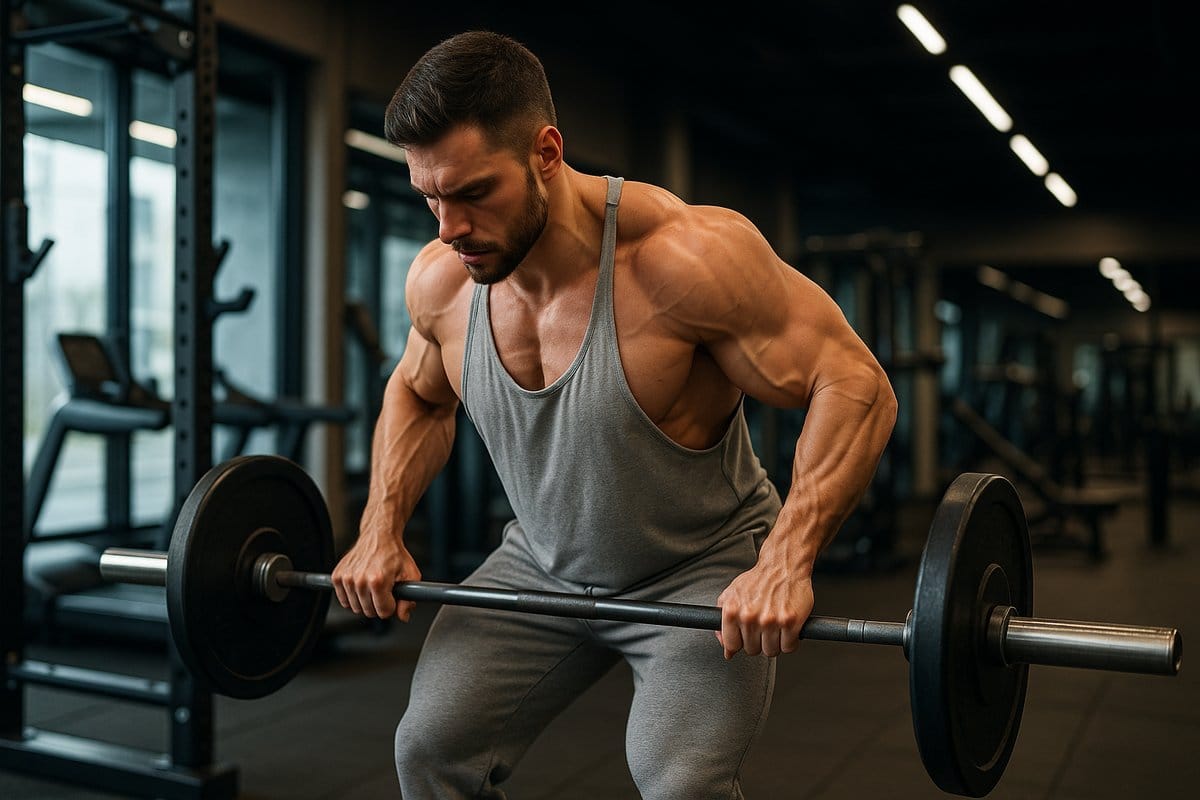When Is the Best Time to Work Out? 65% of Gymgoers Prefer the A.M. [New Data]
Our survey of over 1,000 Americans found mornings are the preferred workout time for most, with people reporting better performance and mood.
Key Takeaways:
- 65% of Americans prefer to work out in the morning, with 33% of men and 21% of women favoring the 6 a.m. to 8 a.m. window.
- 71% say workout time significantly affects the quality of their workout.
- Cardio is the exercise most impacted by workout timing, according to 35% of respondents.
- Over 4 in 10 people who feel a major impact from the timing of their workouts feel they perform better in the a.m.
Ever scrolled through endless fitness advice, wondering when the "magic hour" is to hit the gym? Does the time of day you choose to hit the gym really make a difference in your workout? According to our recent survey, it absolutely does.
We surveyed over 1,000 Americans to uncover the truth about workout timing and preferences and found that 65% of Americans prefer to work out in the morning.
So, if you've been squeezing in workouts whenever you can, it might be time to rethink your strategy. This survey delves into the nitty-gritty of workout timing, revealing surprising gender differences and age-specific preferences that could mean changing up your workout routine.
Most Gymgoers Prefer Working Out in the Morning Over Other Times
We asked our respondents what time of day is best to work out. We found that nearly 1 in 10 prefer working out before 6 a.m.
While we saw a range of workout preferences across genders, the overall trend was surprisingly similar — both men (33%) and women (21%) favored the 6 a.m. to 8 a.m. window.
Younger Americans (18-29) are divided between early birds (6 a.m. - 8 a.m.) and night owls (8 PM - 10 PM) for their workouts. This suggests morning workouts might be energizing for younger folks, while evenings offer a chance to unwind and de-stress.
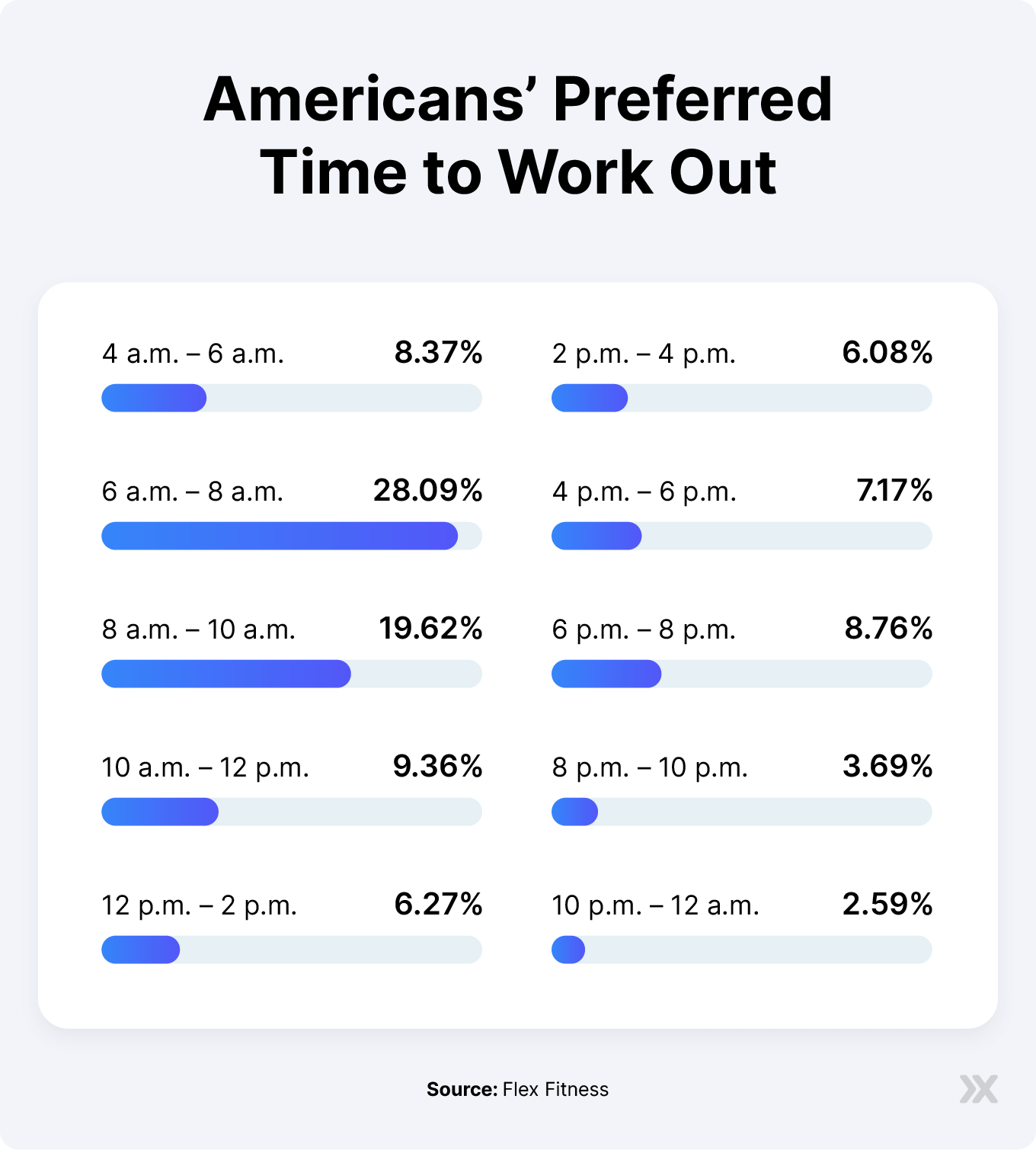
75% Say Workout Time Makes a Big Difference
We wanted to know if gymgoers feel their exercise time impacts their workout quality. Turns out, 75% of our respondents say it impacts their sweat session quality — either "a lot," "a moderate amount," or “extremely,” while just 1 in 10 say it has no impact at all.
A quarter of all respondents said the time of day affects their workout “a lot.” Interestingly, the guys were a bit more likely (by almost 10%) to say the timing throws them off an “extreme” amount compared to women. This suggests that guys may be more picky or are sensitive about their preferred gym time.
In addition, 40% say that they have better workout performance in the morning. This preference was almost equal among men (38%) and women (41%). Working out in the morning could be more beneficial as we typically have less food in our stomachs — 70% more calories are burned when working out on an empty stomach according to a study from Nottingham Trent University.
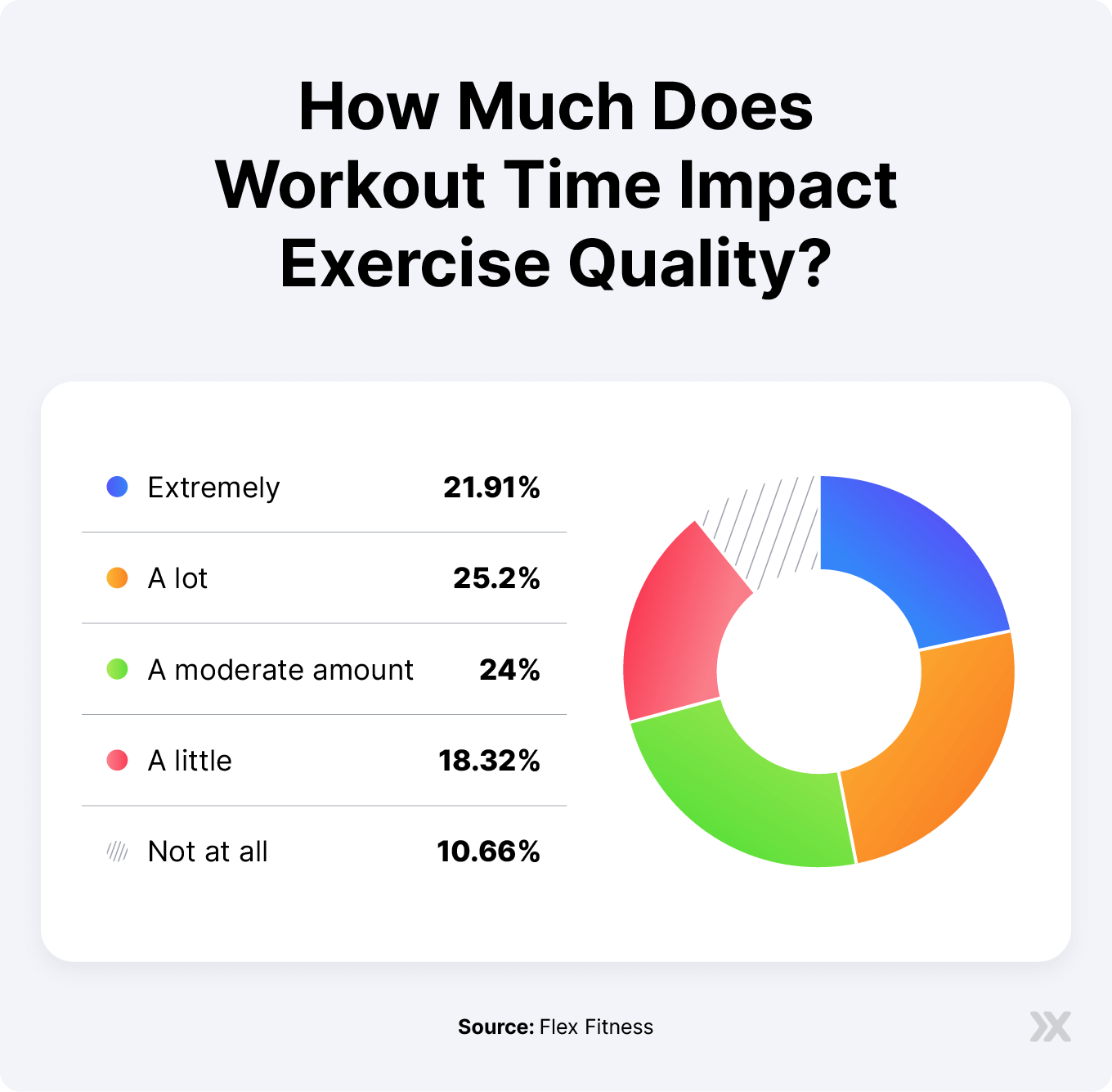
35% Say Cardio Performance Is Most Impacted by Workout Time
We asked respondents what type of exercise is the most affected by workout time. Turns out that cardio is the exercise most people feel needs that perfect timing slot (think early morning jog or an after-work spin class) according to almost 40% of respondents.
This was especially true for folks over 60, with a whopping 52% saying their cardio game is all about the right time. The 30-44 age group is notably more likely to find yoga impacted by workout time compared to other age groups.
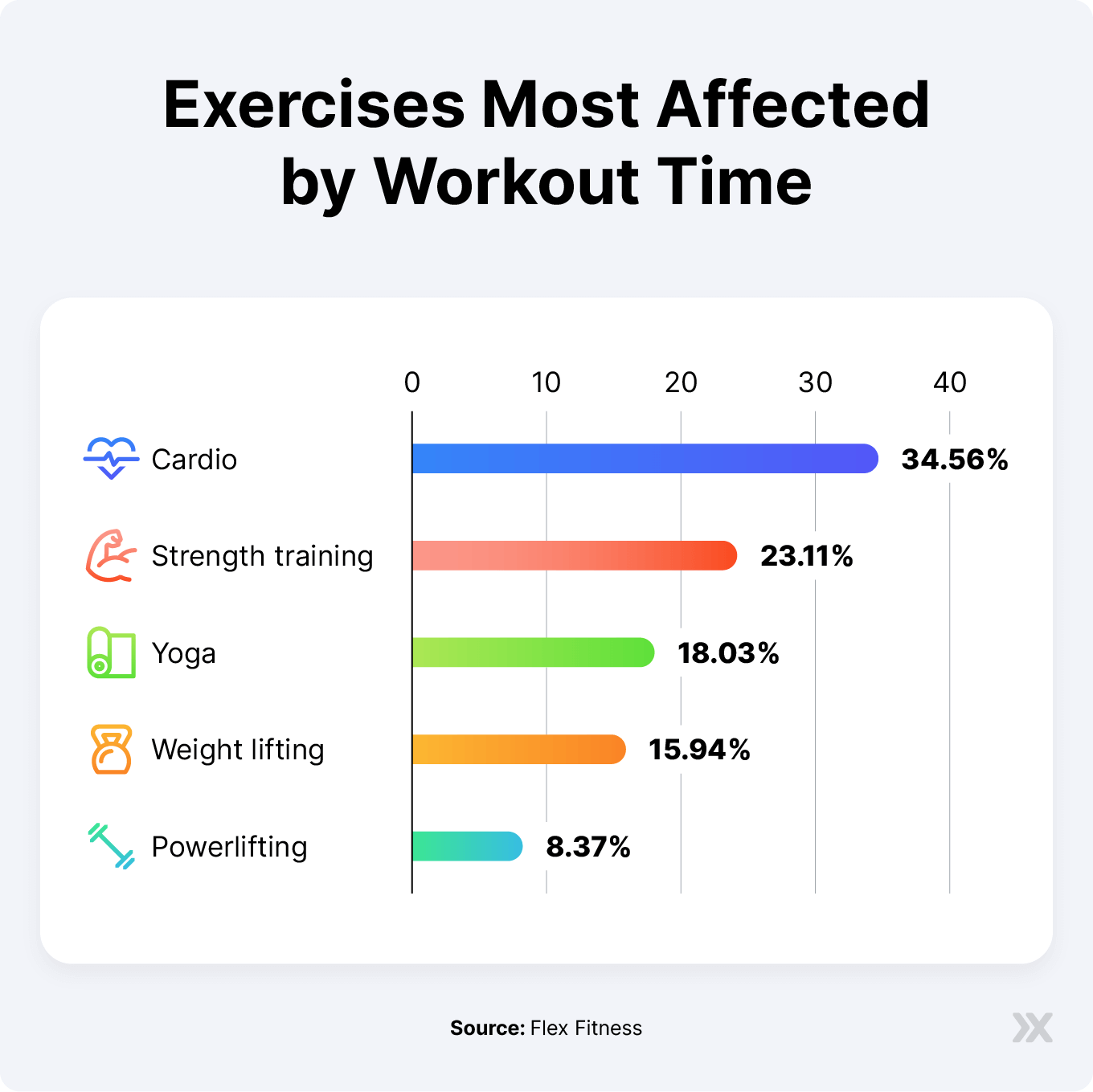
While cardio may be king, a significant proportion of respondents also feel that workout time impacts strength training (23%) and weight lifting (16%). Younger folks (18-29) were more likely to feel this way about weight lifting — maybe they need that extra pre-workout energy boost?
There’s also a gender difference between strength and yoga workouts being affected (12% difference). Men were more likely to say their strength training sessions relied on good timing, while the ladies felt yoga was more time-sensitive.
This suggests workouts could benefit from being a little more personalized, with options and guidance tailored to each gender.
44% Report Feeling Improved Mood + Self-Confidence After Morning Workouts
Respondents were then asked their top perks of working out at their preferred time. The clear winner was improved mood (24%). Improved self-confidence was the second most popular benefit (20%). Other peer-reviewed studies support these findings. According to the Mayo Clinic, finishing a workout before you start the day can:
- Provide a sense of accomplishment
- Boost your endorphins that make you feel more positive
Compared to women, men were over 1.5 times more likely than women to work Out and then feel better job performance (14% vs 8%). Focus seemed to be a bigger benefit for the men too (14% vs 11%).
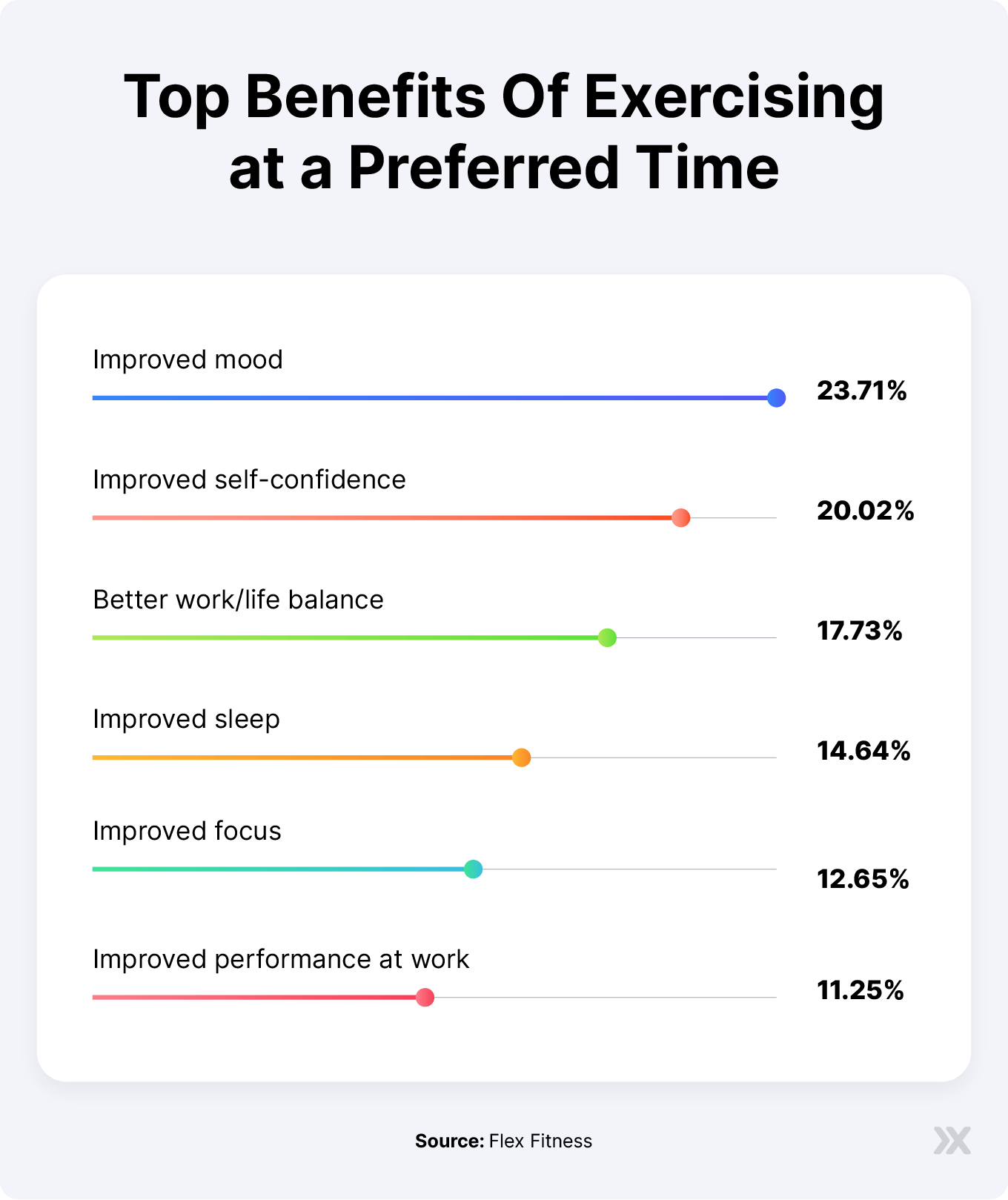
Meanwhile, women leaned more towards feeling amazing overall — better mood (21% vs. 19%), more self-confidence (21% vs. 19%), and even better sleep (17% vs 13%). Studies show that working out in the morning, specifically at 7 a.m. can result in better sleep overall.
When it comes to age differences, the 30-44 age group is more likely to report improved work performance as a benefit, while the 18-29 age group’s biggest impact is improved confidence.
16% of People Say Workouts That Fit Their Schedule Helps Them Stick to Their Preferred Workout Time
We also asked respondents what would make sticking to their workout routine a breeze. The top answer was having workouts that fit easily into their schedules (16%). Perhaps being able to plan a workout routine ahead of time could help fit a gym session into the day. Coming in at a close second (14%) was seeing actual results from your sweat sessions.
Turns out that a workout buddy can be a game-changer for 13% of respondents. Maybe there's something to be said about the power of community at the gym, whether it’s a little friendly competition or moral support to keep you accountable.
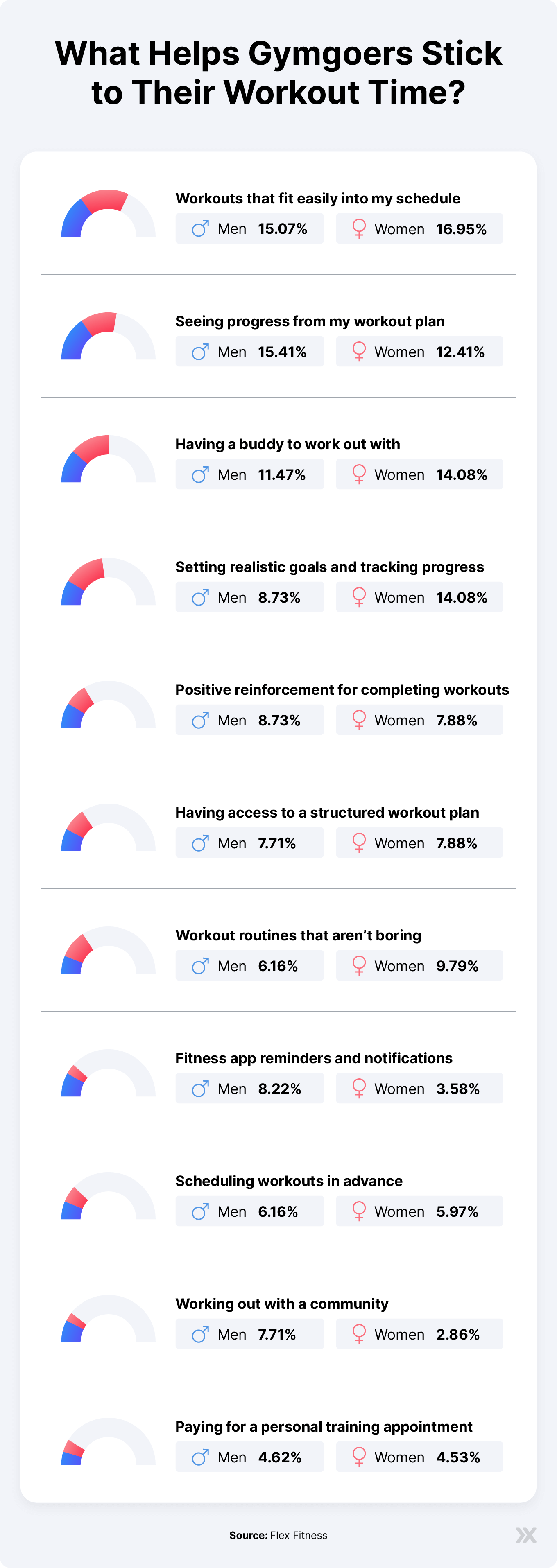
Here’s when gender comes into play — the ladies were all about setting clear goals and tracking their progress (5% more likely than men). Maybe seeing those checkmarks next to their goals is a major motivator. Meanwhile, men leaned more towards the power of the pack, getting pumped by working out with a community (another 5% edge over women).
Inconsistent Workout Schedules Are The #1 Reason People Lose Motivation
When respondents were asked the top reasons that make it hard to stick to their preferred workout time, 43% said it’s because of not having a consistent workout schedule or a structured routine.
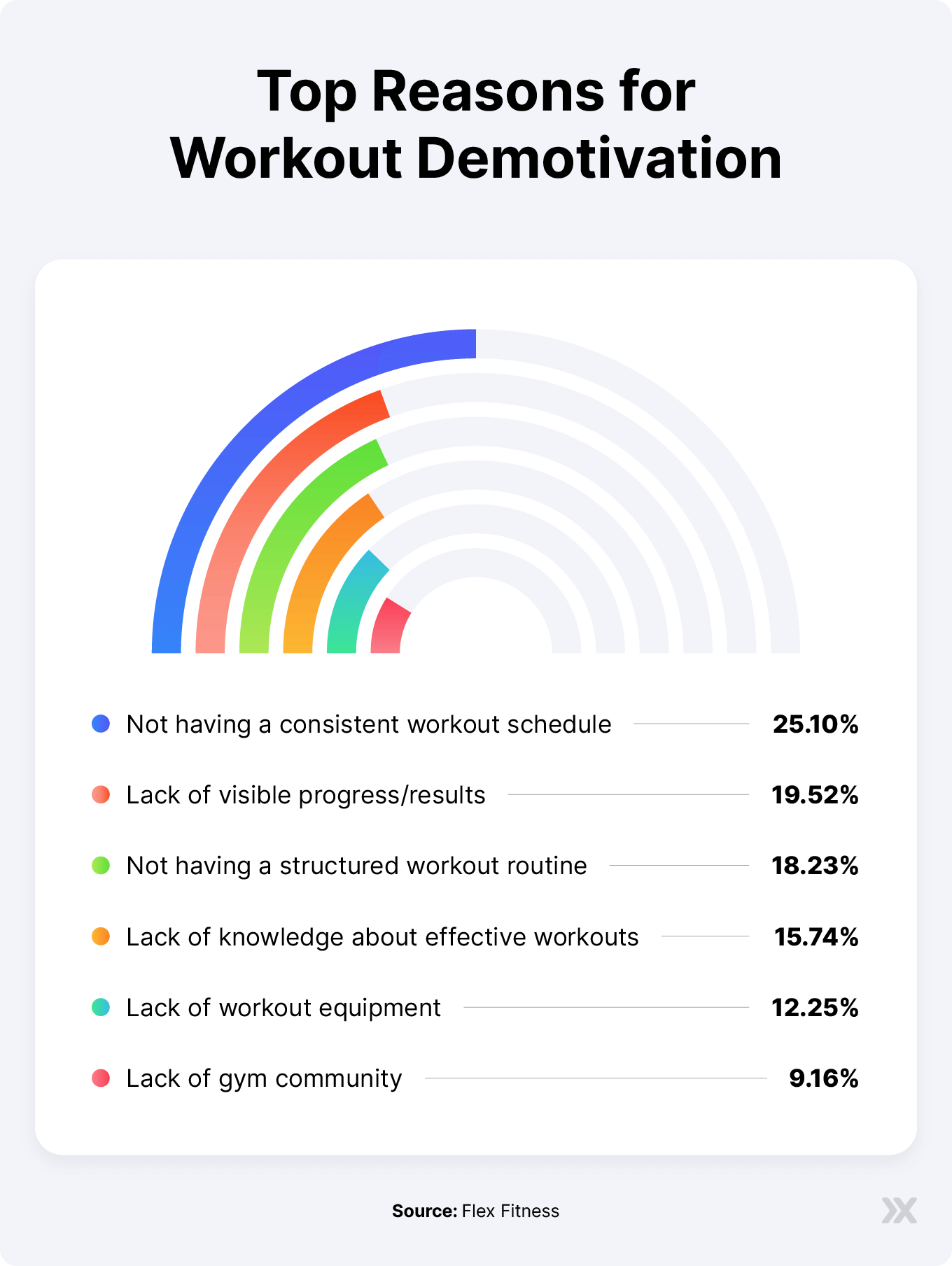
Women were slightly more likely (by about 6%) to blame an inconsistent schedule for their workouts. On the other hand, men are most demotivated by a lack of knowledge about effective workouts. This could mean that these respondents could mostly benefit from guidance and support, such as tailored workout plans and educational resources, to avoid feeling too lazy or unmotivated to exercise.
The second biggest struggle (20%) was lack of visible progress/results. This factor affected women a bit more than men. Also, motivation has the biggest impact on 18-29-year-olds.
Stick to a Workout Routine with Flex Fitness
Our survey reveals that timing your workouts matters — finding your peak window boosts performance and motivation. The key? Personalized plans that fit your schedule and preferences. With the right timing, structure, and a supportive community, crushing your fitness goals becomes fun.
Consider the Flex Fitness app to reach your goals and tailor your routine. This free app can help you build muscle or lose weight with structured workout programs and instructional guides. Level up your exercises, hit personal records, and compete with friends. With Flex Fitness, you can also stay motivated with a supportive community, share progress pics, and get fit together.
Methodology
The survey of over 1,000 adults aged 18+ was conducted via SurveyMonkey Audience for Flex Fitness on July 11, 2024. Data is unweighted and the margin of error is approximately +/-3% for the overall sample with a 95% confidence level.
References
- Nottingham Trent University. (2023). Exercising on an empty stomach burned 70% more fat, study found. https://www.ntu.ac.uk/about-us/news/news-articles/2022/11/exercising-on-an-empty-stomach-burned-70-more-fat,-study-found
- Mayo Clinic. (2024). Exercise conundrum: When's the best time to work out? https://www.mayoclinichealthsystem.org/hometown-health/speaking-of-health/best-time-of-day-for-your-workout
- National Library of Medicine. (2014). Effects of exercise timing on sleep architecture and nocturnal blood pressure in prehypertensives https://www.ncbi.nlm.nih.gov/pmc/articles/PMC4270305/
Related Articles
Related articles
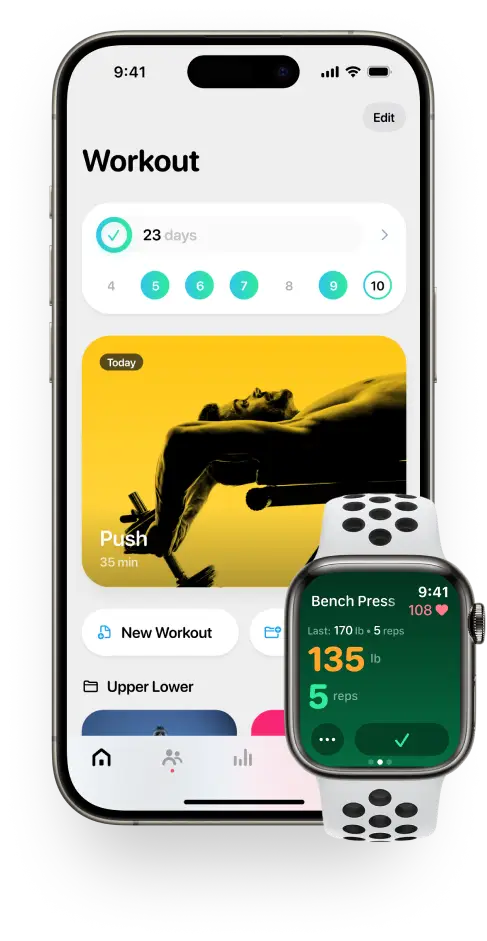
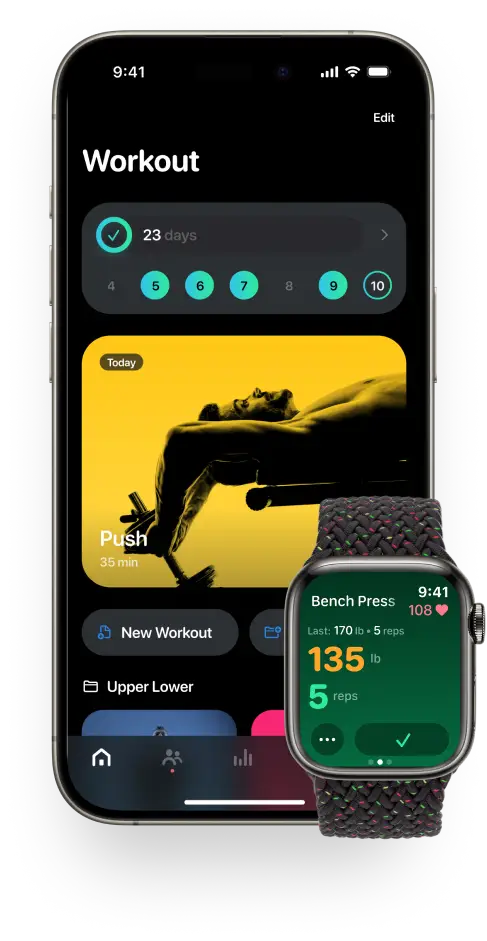
Get fit with Flex
Build muscle & lose weight fast for free.
Available on iPhone + Apple Watch



